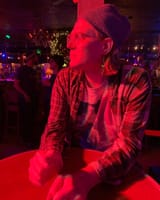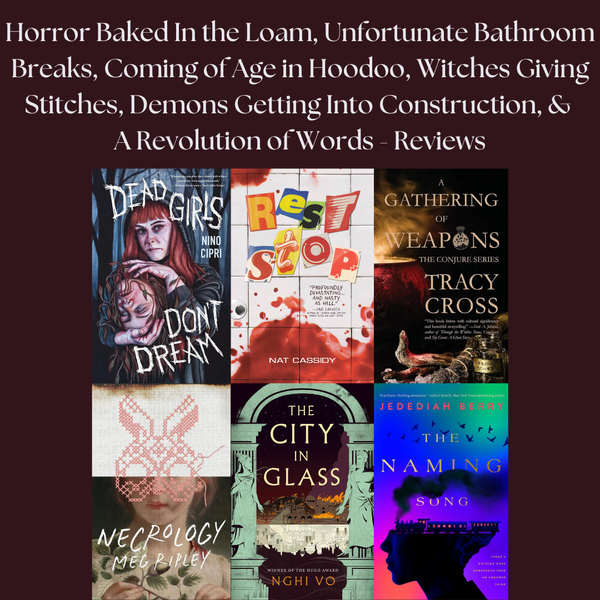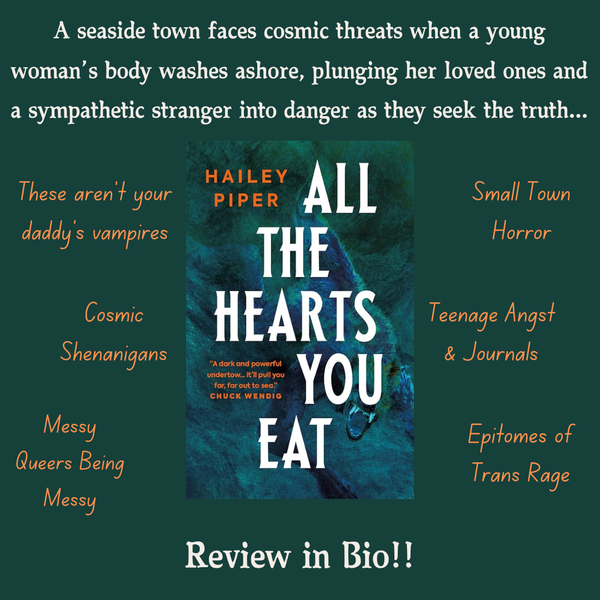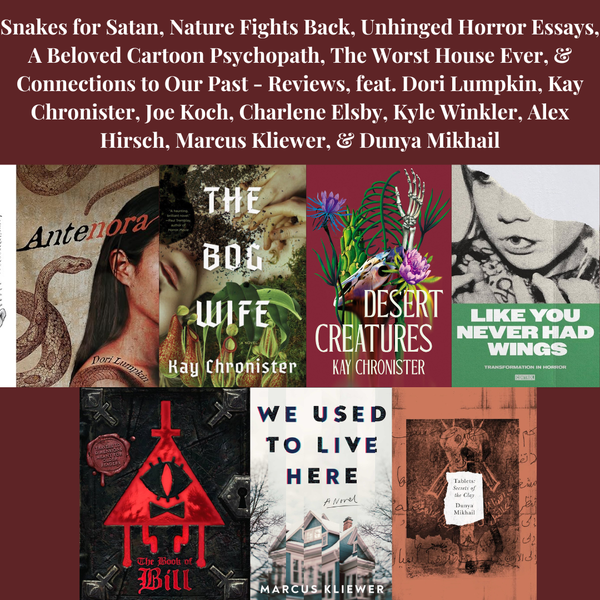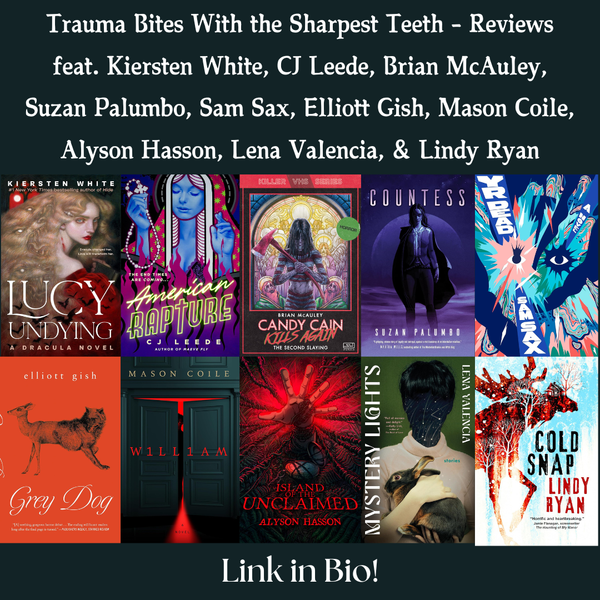A Warm Welcome, Plus a New Review!
In which Violet stumbles through a new platform to write things on in hopes of making her life semi-easier.
Greetings, beloveds!
If you are here/receiving this from me, you more than likely follow me on Instagram or Twitter where I do the majority of my book reviews. The issue I found myself running into with these accounts is that word counts usually restrict me from sharing the full breadth of my feelings when it comes to the books I read, especially if I’m reviewing multiple books in one post.
So I decided to try something different. A place where I could ramble to my hearts content, hopefully garnering some form of audience along the way. Welcome!
Today’s reviews center around four audiobooks I’ve recently finished and how they each share narrative themes that hit me deep in my softest parts:
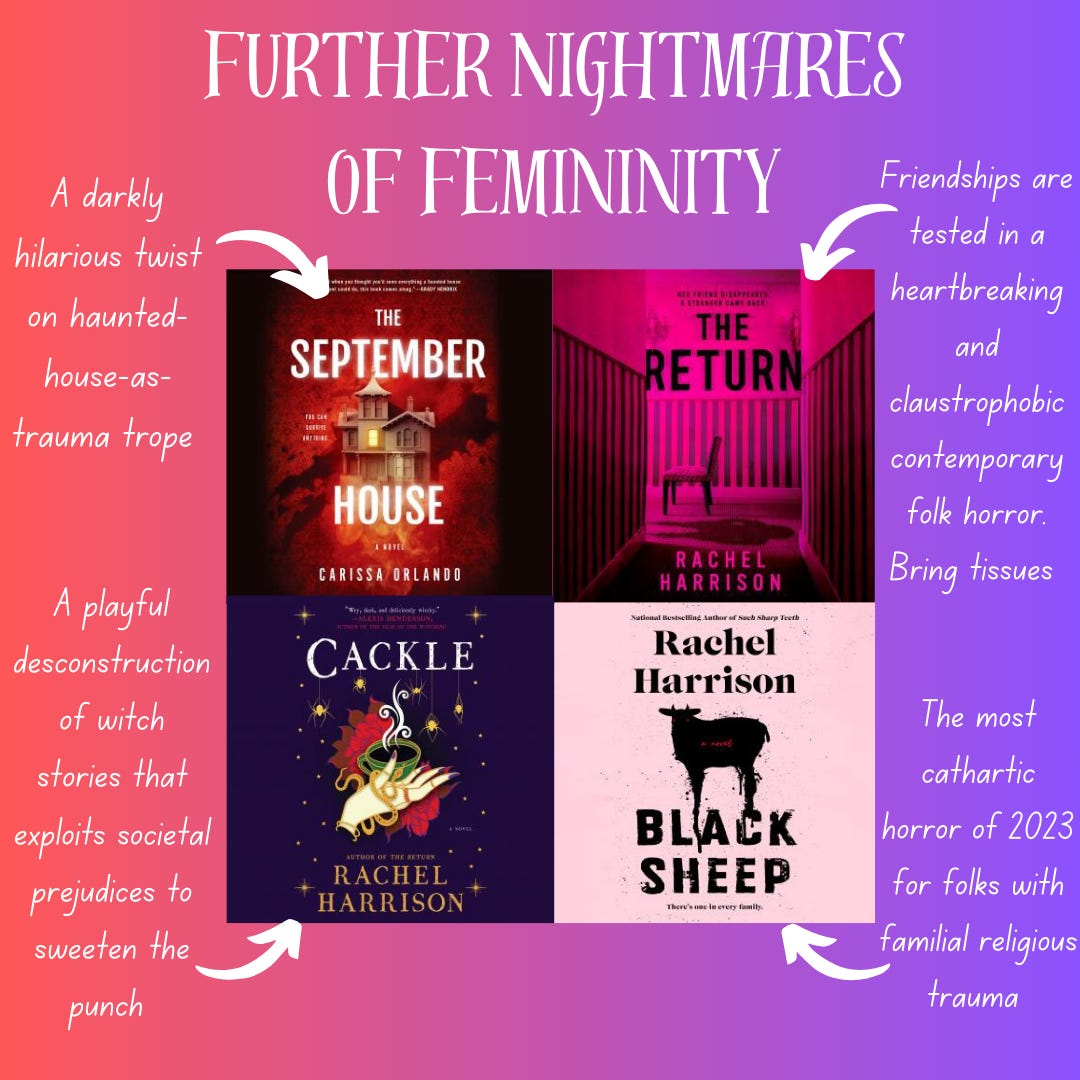
I’ve seen Rachel Harrison mentioned just about everywhere since I gracefully nosedived back into the arena of horror fiction. I initially attempted to read The Return a couple years ago, but it got washed away amongst other releases at the time.
Thanks to my access to Penguin Random Audio through work (endless thanks) I’ve been able to return to a lot of books I never got to read. I was delighted to find that Harrison’s books were among them.
The September House was a recent horror release that I hadn’t heard about, but was deeply intrigued by the premise. What I would eventually learn is I was in no way prepared for the places this narrative would take me. Of this list, this was the first one I listened to before beginning my Rachel Harrison deep dive.
What I hope to achieve in this inaugural post is provide succinct reviews of each book, followed by a summation of my thoughts/connections at the end. Happy reading!
The September House by Carissa Orlando - Margaret has been living in her dream home for decades, however, such living does not come without caveats. Despite the house’s “perfection,” it is extremely haunted and has caused her, as well as her husband, Hal, to mentally and physically prepare for the terror every September. While Margaret has acclimated to these seemingly maddening seasons of blood pouring from the walls, wails from the basement, and ghosts wandering the halls as normal, Hal can’t take it anymore and has left.
When Margaret’s 30-something daughter calls to ask why her father has disappeared, Margaret’s worst fears arise when Katherine comes to the home to help find Hal. Neither of them anticipating the horror this search will unleash…
Amidst a lengthy canon of haunted house books, stories, movies, and everything in between, Orlando crafted a book that legitimately gave me whiplash several times. She is perfectly aware of not only our expectations of the subgenre, but also of gender, societal, and even race stereotypes—using each to keep the reader guessing until she delivers the final delirious blow.
Throughout the audiobook, I was so enraptured in figuring out what the twist may be, as well as Kimberly Farr’s breathtaking performance, that when the eventual rug-pull did arrive I was purely blown away by Orlando’s execution. Like many of the best twists, all of the pieces are laid out throughout the story, but what she does that feels especially unique to me is utilizing the audience’s reliance on unreliable-narrator and haunted house tropes to tell a genuinely compelling deconstruction of the effects of domestic trauma. The climax is so surreal, but it also breaks your heart and brings tears to your eyes when you realize what it’s doing.
The Return by Rachel Harrison - Where does one start when approaching a new author? I personally like to begin at the beginning, as a way of seeing the general progression of an author’s craft. This felt especially important with Rachel Harrison, whose writing has received rave accolades from many folks I admire. Much like The September House, I never anticipated how much this novel would tear me open.
When their friend Julie went missing in the Adirondacks, Mae, Molly, and Elise believed they may never see her again. It is to their immense surprise then that she re-appears after two years and with no memory of what happened to her. Attempting to ease Julie back into the swing of things, Mae rents rooms at a new, yet uncanny, bed and breakfast. However, when Julie finally arrives, her friends are shocked to find her emaciated, suddenly craving meat, and behaving in curious ways. As Elise struggles to find out what is happening to her best friend, the truth steadily presents itself in gruesome ways.
I love this book with every fiber of my being. It’s an effectively scary folk horror that explores the complexities of contemporary female friendship, grief, and the visceral pain that comes with truly letting someone go. I bawled my eyes out in the final hour of this book. The performance only strengthened the messy personalities grappling with grief, love, and wanting to hold onto love that may not realistically serve you.
Harrison has a firm understanding of the dynamics that often arise in female friendships, and, much like Orlando, exploits these to grant further gravity to the climax. The ending unmoored me in ways I desperately needed at this moment in my life.
Cackle by Rachel Harrison - Moving on to a decidedly comfier horror—sorry Twitter—Cackle retains Harrison’s wit and scathing satire, but with a decidedly more reserved delivery. Make no mistake though, it still has some pretty spooky moments.
Following her separation from her husband, Annie accepts a new teaching position in a picturesque rural village. Hoping to heal from said heartbreak, she strikes up an unlikely friendship with the ethereal Sophie, a woman who seems to have an effect on the townsfolk, yet an even deeper effect on Annie. As Annie’s confidence and inner strength grow, so to does her questions surrounding why the town seem to be so afraid of Sophie.
I’ll start off by saying this: Cackle is Harrison’s queerest book that I’ve read so far. While not overtly queer, the vibes are strong with this one. The friendship between Sophie and Annie is beautiful. A depiction of female friendship we rarely see in fiction without patriarchal or white supremacist strings attached, so it was pleasant to see throughout the narrative.
I had low-grade anxiety throughout the book, and while I am self aware enough to know a lot of that is my own overthinking, Harrison also knows exactly what she’s doing in how she unravels toward the climax. Like The Return’s exploitation of tropes, Cackle knows what the audience often expects of witches and uses that to her advantage to deliver a nuanced tale of coming into your own power.
Black Sheep by Rachel Harrison - Last but not least, we come to the newest of Harrison’s books. A particularly twisty tale of a young woman returning to her childhood home, which happens to be the epicenter of a religious cult she escaped from years before. Vesper is delivered an invitation to her former boyfriend’s wedding to her former best friend. Begrudgingly accepting, she travels back to her home only to learn disturbing secrets about her identity and upbringing. I’m going to stop there because the less you know going in, the better.
Black Sheep may be one of the most cathartic books that I have read this year. It’s ultimate theme of finally giving in to the rage borne from trauma—especially if you happen to hold generational religious trauma—burns so darn bright. The gleefully disturbing climax feels like your shoulders relaxing following a particularly brutal session of being gaslit by your loved ones. While the theme of embracing your own feminine rage isn’t entirely new, the way in which Harrison synthesizes said rage feels refreshing, considering the topic of the book.
As I finished the audio for Black Sheep, I found myself filtering all three books through my mad comparative literature brain.
The cheeky title at the top of the earlier graphic alludes to these all being further nightmares of femininity. Throughout each book, both of these authors are using their unique voices to deconstruct aspects of what it means to be a woman or feminine person in our contemporary world. Each character is contending with expectations, heartbreaks, prejudices, amongst plenty of other, well, nightmares.
I’m not treading new ground in saying this but Orlando and Harrison both seem to have their respective fingers on some of the pulses that keep “the way things oughta be” going. Don’t cause trouble. Don’t be angry. Don’t speak up for yourself. The list is exhaustive at this point. Yet, despite these themes seeming like well-trodden ground, the beauty of fiction, especially horror, lies in each respective authors interpretation and experience of these themes. Plus it’s really nice to read stories that discuss the embracing of rage and fear without delving into the trappings of Girlboss, “Good For Her” territory.
These books are emblematic of the growing space in horror that calls for a prickly, seldom less-palatable femininity. While each book is absolutely centered in forms of white women’s empowerment, it’s nice to see authors trying to reckon with what that means in the grander scale of publishing. Regardless, these are two authors to definitely keep your eyes open for as their careers continue.
